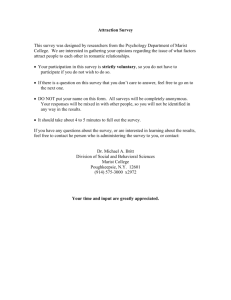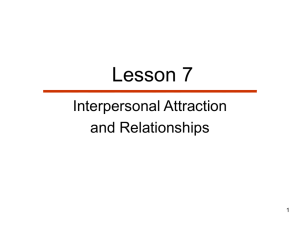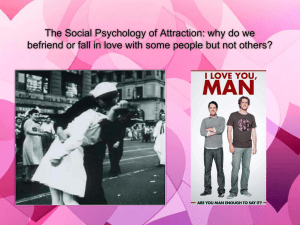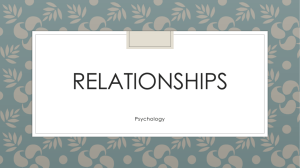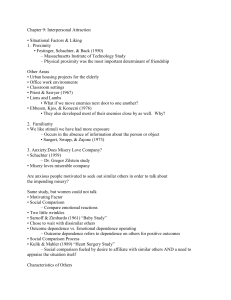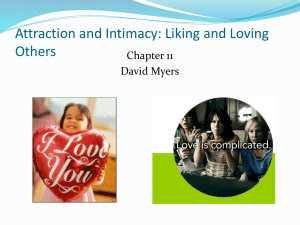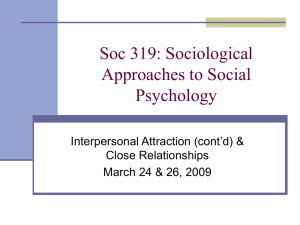INRW-0420 - Common Final-Exam (Essay ONLY).doc
advertisement
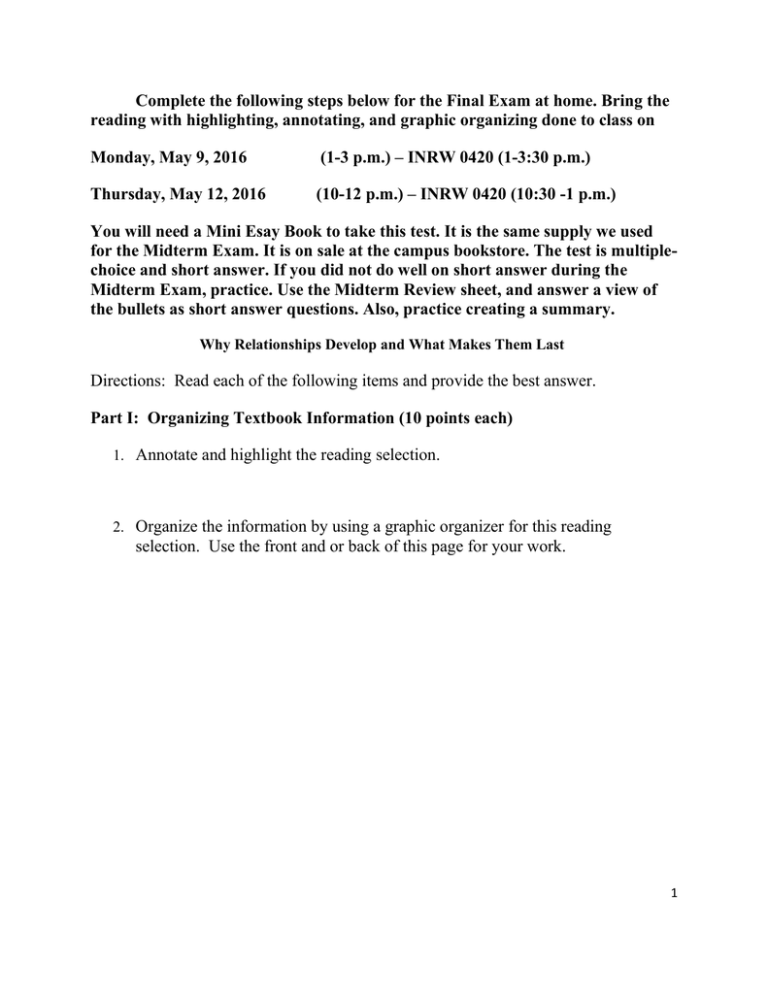
Complete the following steps below for the Final Exam at home. Bring the reading with highlighting, annotating, and graphic organizing done to class on Monday, May 9, 2016 (1-3 p.m.) – INRW 0420 (1-3:30 p.m.) Thursday, May 12, 2016 (10-12 p.m.) – INRW 0420 (10:30 -1 p.m.) You will need a Mini Esay Book to take this test. It is the same supply we used for the Midterm Exam. It is on sale at the campus bookstore. The test is multiplechoice and short answer. If you did not do well on short answer during the Midterm Exam, practice. Use the Midterm Review sheet, and answer a view of the bullets as short answer questions. Also, practice creating a summary. Why Relationships Develop and What Makes Them Last Directions: Read each of the following items and provide the best answer. Part I: Organizing Textbook Information (10 points each) 1. Annotate and highlight the reading selection. 2. Organize the information by using a graphic organizer for this reading selection. Use the front and or back of this page for your work. 1 WHY RELATIONSHIPS DEVELOP AND WHAT MAKES THEM LAST From Essentials of Psychology Textbook By Benjamin Labey Interpersonal Attraction 1 Throughout the complicated process of person perception (the process of forming perceptions of others), a unique impression of each person is formed. But, although person perception is a highly personal process, some general factors influence whether one person will be attracted to another. These include proximity, similar and complementary characteristics, competence, physical attractiveness, and mutual liking. Proximity 2 An important, but not very romantic, cause of attraction is proximity, or geographical closeness. It's difficult to fall in love with someone you hardly ever spend time with. Physical closeness and the resulting interpersonal contact are essential to the development of attraction. You are more friendly with people who live next door to you than with people who live farther away. Why does this happen? Physical proximity increases interactions, and repeated exposure to people tends to increase liking. Perhaps you can remember a song you didn't like at first but learned to like after hearing it played on the radio many times—it's the same with people. Similar and Complementary Characteristics 3 In terms of interpersonal attraction, do "birds of a feather flock together" or do "opposites attract"? Are you more likely to be attracted to someone as a friend or lover who is similar to you in many ways or quite different from you? The answer is both, in different ways. 4 It's enjoyable to have a friend who jogs with you, who pats you on the back for the healthy way you eat, and who shares long, delicious philosophical discussions with you. In general, similarity is highly important in attractiveness. We tend to be most attracted to those people who have similar values, interests, and attitudes. 5 Opposites can also attract, however. Sometimes the attractiveness of persons unlike us is purely erotic. But opposites also attract when the opposite characteristic complements, or advantageously "fits" with, one of our own characteristics. A woman 2 might also be attracted to the fellow at the party tonight in part because he has an outgoing personality, whereas she is more reserved. She may feel that she is a good listener who gets along better with talkative people than with those who are quiet like herself. And she may feel that, when she is with an outgoing person at social gatherings, he makes it easier for her to interact with other couples than a quiet man does. Similarly, a dominant person might prefer a submissive person, and a person who likes to "take care of" others might prefer someone who likes to be taken care of. 6 Opposites can attract when people who are different from each other like each other. It's often more flattering and attractive to be liked by someone who holds opposite values and opinions than by someone who holds similar ones. But opposites usually do not attract; instead, opposites usually repel in personal relationships. A person who intensely advocates liberal causes probably would not like a person who vocally supports conservative causes. And a highly religious person probably would not find a disdain for religion attractive in another person. Competence 7 We tend to be more attracted to competent than to incompetent people. Intelligence, strength, social skill, education, and athletic prowess are generally thought of as attractive qualities. But people who are seen as too competent may suffer a loss in attractiveness, perhaps because it makes us uncomfortable to compare ourselves unfavorably with them. Physical Attractiveness 8 Other things equal, people tend to be more attracted to physically beautiful people. In the absence of other information, we tend to like beautiful people more and think of them as nicer, better adjusted, more sexual, and more intelligent. Not only is physical attractiveness important, but it also seems to be the most important factor in early stages of attraction. 9 But don't despair; there is hope for the rest of us! We might all prefer to be dating someone who looks like a movie star. People actually tend to choose dates and mates who closely match themselves in degree of physical attractiveness. What is more, physical beauty is a highly subjective quality. Thus, even if you do not think your next-door neighbor is just much to look at, chances are that someone else will come along who thinks he or she is just beautiful. 10 Perhaps the nicest thing about physical attractiveness and liking, though, is that the relationship goes both ways. Not only is it true that we tend to like people better when 3 we think they are beautiful, but, as we get to like people better, we begin to think they are more beautiful. Thus, to a certain extent, love is blind and beauty is in the eye of the beholder—and nothing could be nicer. Mutual Liking 11 Let's end this discussion of factors involved in interpersonal attractiveness on an upbeat note. Liking often leads to liking in return. If Vicky likes Neal, she has made herself more attractive to Neal simply by liking him. Neal, if he is like almost everyone else, will be more attracted to people who like him than to people who do not like him. Liking someone will not turn you into an irresistible beauty, but it will help. 12 One reason this seems to be so is that liking someone actually makes you seem more physically attractive, especially if a little lust is thrown in. You have heard people say that a person is more beautiful when in love, and it's true. Your eyes are more attractive when you are in love. Your pupils tend to be more dilated (opened) when you look at someone you find sexually attractive, and others find large pupils more attractive sexually. And your posture and movements are often more attractive and seductive. In subtle ways, you are most physically alluring when you are attracted to another person. 13 Another reason that liking tends to lead to liking is that you are nicer to the people whom you like, and being nicer makes you more attractive to them. A number of studies show, for example, that we tend to like people more when they praise us or when they have done favors for us. Favors and praise feel nice, and we like the giver better for having given them to us. Thus, send him flowers or give her a compact disc—it might just tip the balance of love in your favor. As you might expect, there are limits on the impact of praise and favors. If they are excessive, and especially if the other person thinks you are insincere and have selfish motives for giving them, praise and gifts will not lead to increased liking and may even lessen the liking. Gender Differences in Interpersonal Attraction 14 It's a commonly held belief in our culture that men are not very interested in romantic love but, rather, enter into long-term relationships for the sex and the domestic help (cooking, cleaning, and mending). Women, in contrast, are viewed in our society as approaching relationships in a more emotional, romantic way. The results of surveys conducted during the 1960s, however, suggested that this popular stereotype not only was incorrect but had reality reversed. Men rated falling in love as being a more important reason for beginning a relationship than did women. Women 4 saw other qualities of the relationship, such as respect and support, as being more important. In one survey, two-thirds of male unmarried college students said they would not marry unless they felt romantic love for their prospective wife, whereas less than one-fourth of college women felt that romantic love was a prerequisite for marriage. 15 However, more recent surveys suggest that things have changed in the United States concerning gender differences in valuing romantic love. Today, the great majority of both women and men feel that being in love is necessary for marriage. Perhaps, as women have come to feel less dependent on marriage for financial support, they have felt able to enter into marriage only when they are in love with their future partner. 16 This does not mean that men and women fall in love for all the same reasons, however. The evidence is clear that women place more emphasis on their romantic partner's intelligence, character, education, occupational stages, ambition, and income than do men. These qualities are not unimportant to men, but they are comparatively more important to women. In contrast, there are no gender differences in how much sense of humor and a pleasant personality are valued in romantic relationships, but men place greater emphasis on physical attractiveness than do women. Again, it is not that physical attractiveness does not play a role in romantic attraction for women (it does), but women place considerably less emphasis on physical attractiveness than do men. Interestingly, these same results have been found in different generations in the United States and across a number of cultures. 17 It is important to keep in mind, however, that there are large differences among the members of both genders. Perhaps the most striking thing about the cognitive algebra of person perception is that different people often seem to be using different equations! Whether a characteristic is considered positive or negative and how much weight it will carry in person perception differ markedly from individual to individual. Because different people evaluate the same characteristics in different ways, some people are going to love you, some are going to dislike you, and the rest will find you so-so. Maintaining Relationships 18 We have talked about some of the factors that determine whether you will be attracted to another person. But how about the factors that are involved in maintaining relationships? Assuming that one of the people whom you are attracted to becomes your friend, lover, or spouse, what things determine whether you and your partner will stay in the relationship? So many relationships that begin in joy end in a long cry. Why? Two of the major factors are (1) the difference between what you expect to find 5 in a relationship and what you actually find and (2) the degree to which the relationship is fairly balanced or equitable. Expectations versus Reality in Relationships 19 When you begin a relationship with someone you do not know very well, part of what you fall in love with is what you expect the person to be like. Some expectations may be based on good evidence. One of his friends has told you that he is an especially nice and fair person, so it's reasonable to expect him to be fair and nice to you. You know that he is in the same profession as you, so you can expect to be able to share your workday experiences easily with him. Other expectations are based on less evidence. He has behaved in a strong, self-assured way so far, so you assume that he will always be this way, even though the biggest challenge you have seen him handle is the waiter's mistake of bringing tomato soup instead of minestrone. You know that he is a wonderful lover, even though he has only just kissed you goodnight once. He dressed like an outdoorsman, so you expect him to love backpacking as much as you do. And he is well educated, so you feel sure he will share your love of serious literature. 20 The point is that, even when your expectations are fairly well grounded, some of them will turn out to be incorrect. He will not be exactly as you expect him to be before the relationship begins. This is one primary reason relationships end. If the other person turns out to be significantly different from the person you expected, you may be unwilling to stay in the relationship. This disappointment may not lead directly to an end of the relationship; it may affect the relationship indirectly. Disappointment can lead you to be an unenthusiastic or irritable partner, which can lead to discord and an unhappy ending of the relationship. 21 Even when you know a person well before beginning a serious relationship, differences between expectations and reality can be a problem. One common source of unfulfilled expectations is the predictable shift from passionate love to greater companionate love. When two people fall in love, they often feel intense passions that are a heady and magnificent mixture of romantic, sexual, and other feelings. Even in the most healthy and enduring relationships, however, passionate love gradually becomes companionate love—a less intense but wonderful blend of friendship, intimacy, commitment, and security. Although romantic and sexual emotions often continue to be an important part of companionate love, these feelings almost inevitably become less intense over time. 22 If one or both partners does not expect passionate love to change, or if the change takes place before expected, the reality of passionate love's blending into 6 companionate love can be difficult. On the other hand, if both partners truly want a long-term relationship (many people stay in relationships only as long as the passionate love remains, then leave feeling unfulfilled or hurt), and if the disappointment that often surrounds the lessening of romantic love is handled with compassion on both sides, the transition usually can be managed. 23 Finally, expectations about a love relationship can fail to match its reality because partners change over time. Sometimes, the outdoor person becomes a happy couch potato, and the party animal becomes a health-conscious, jogging vegetarian. If children arrive, and if promotions are received (or not received), these and other changes can alter the reality of the relationship as well. If these changes in one's partner are not welcome, the reality of the changed relationship can be upsetting. Sometimes, however, a change in a partner can make a good relationship even better. Equity in Relationships 24 What do we know about whether relationships will last? They are more likely to endure when there is equity. In other words, they tend to last when the good things that we give to our partner are about equal to what our partner gives us. These good "things" that partners give to one another are many and varied. They include compliments, back rubs, help with homework, a day off without the kids, flowers, jokes, love making, a willingness to listen about a bad day, interesting meals, kisses, and interesting conversations. They also include things like physical attractiveness (a nice-looking person is enjoyable to look at), honesty, faithfulness, and integrity. 25 If either member of a relationship perceives the relationship to be inequitable, that partner will either take steps to restore equity or will leave the relationship. Interestingly, we become uncomfortable in relationships either when we feel that we receive too little compared with what we give or when we receive too much compared with what we give. In either case, we will be motivated to restore equity by giving more or less or by asking (or in some other way inducing) the other person to give more or less. Source: Adapted from Benjamin Lahey, Essentials of Psychology, pp. 462-466. Copyright © 2002 McGraw-Hill. Reprinted by permission of The McGraw-Hill Companies. 7 8
